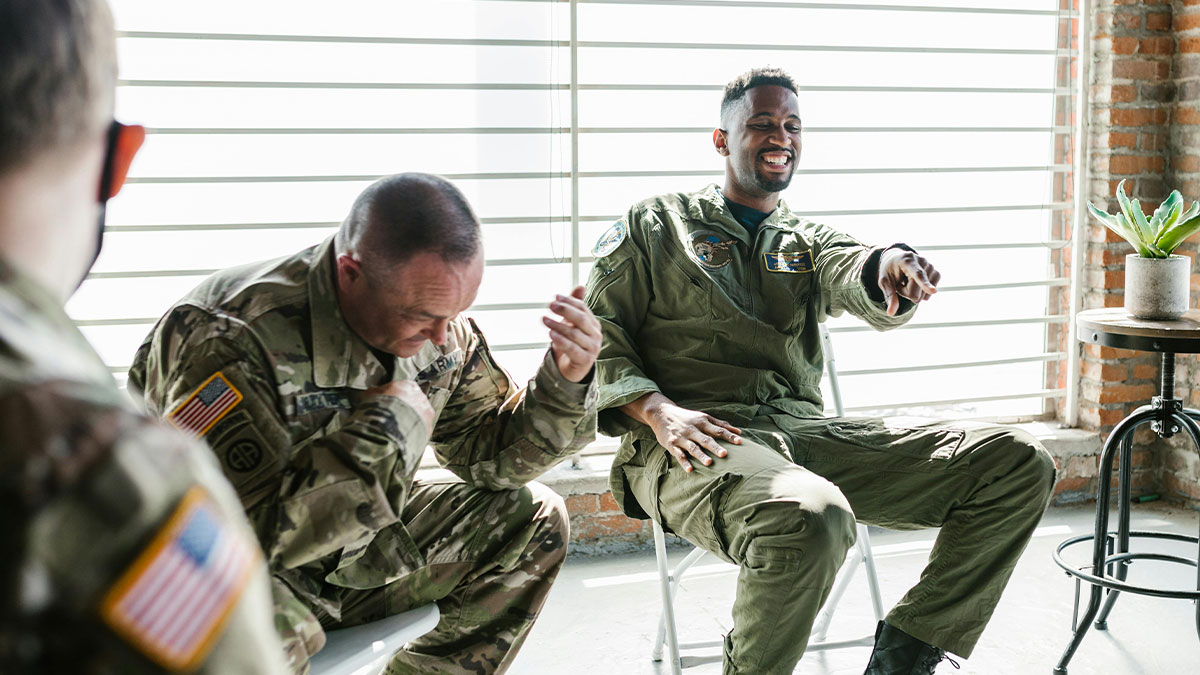We grasp the pressing need for customized mental health resources for disabled veterans. Peer supportA system where individuals with disabilities provide support and share experiences to help each othe... is essential, and programs like the National Veterans Crisis Line and Peer Service Coordinators offer immediate and direct aid. Online platforms, such as the Texas Veterans App and Project Odyssey, provide accessible therapy and peer connections. Effective provider training and grant-supported initiatives guarantee veterans receive thorough care. Collaborative efforts from organizations like HHSC and the Texas Veterans Commission help maintain these services. If you're seeking in-depth information on these life-saving resources, we have more to share.
Key Takeaways
- Veteran Peers and Crisis Line: Immediate support is available through Veteran Peers and the National Veterans Crisis Line.
- Online Therapy Options: Accessible online therapy platforms connect veterans with licensed therapists for tailored mental health support.
- Community and Peer Networks: Online communities offer mental health support and camaraderie for disabled veterans.
- Comprehensive Support Services: Services include individual, group, and family counselingProfessional guidance to help individuals cope with emotional, mental, or social challenges, particu..., housing assistance, and emergency financial aid.
Connecting With Veteran Peers

Connecting with veteran peers can be a vital step in addressing the unique challenges faced by disabled veterans. Often, the experiences and traumas we've encountered during military service can feel isolating and overwhelming. However, connecting with those who've walked a similar path can provide a sense of understanding and camaraderie that's hard to find elsewhere.
Peer Service Coordinators play an important role in this process. They provide direct peer-to-peer support to veterans and their families affected by military trauma. These coordinators are specially trained and contracted through 37 Local Mental Health Authorities (LMHAs) to reach out to at-risk individuals who mightn't seek help through traditional channels. Their mission is to make sure that no veteran feels alone in their struggle.
If we're ever in immediate need of support, the National Veterans Crisis Line is just a call away. By dialing 9-8-8 and pressing 1, we can connect with a Veteran Peer who understands our background and can provide immediate assistance.
Additionally, the TexVet program by TAMUHSC offers online resources and information, making it easier for us to find the help we need. In this shared journey, veteran peers are invaluable allies.
Program Administration Support
The backbone of mental health support for disabled veterans lies in the robust program administration facilitated by the HHSC and the Texas Veterans Commission. These organizations collaborate seamlessly to guarantee that essential services reach those who need them most. The Legislature appropriates funds specifically for these programs, ensuring their effectiveness and sustainability.
Key components of this program administration include:
- Contracts with Local Mental Health Authorities (LMHAs) and Local Behavioral Health Authorities (LBHAs): These contracts are essential for delivering thorough mental health servicesProfessional services that support individuals in managing mental health conditions, such as therapy... across various regions.
- Partnership with Texas A&M University Health Science Center (TAMUHSC): TAMUHSC provides crucial online resources through the TexVet program, catering to the mental health needs of disabled veterans.
- Deployment of Peer Service Coordinators: 37 LMHAs are contracted to provide these coordinators, who offer peer support and guidance.
- Continuous Monitoring and Evaluation: Regular assessments ensure that the programs meet their objectives and adaptA grassroots disability rights organization in the U.S. that focuses on promoting community-based se... to evolving needs.
Role of Peer Service Coordinators
Among the key components of effective program administration is the essential role of Peer Service Coordinators, who offer direct, peer-to-peer support to veterans and their families affected by military trauma. These coordinators are often veterans themselves, providing a unique perspective and understanding that traditional mental health services might lack.
By hiring or contracting Peer Service Coordinators through 37 Local Mental Health Authorities (LMHAs), we guarantee that those at risk of isolation from support services are engaged and assisted.
Peer Service Coordinators play a vital role in reaching out to veterans who mightn't seek help through conventional channels. They provide tailored support, ensuring that each veteran's specific needs are met. Whether it's connecting veterans to essential mental health services or offering confidential and personalized assistance, these coordinators make a significant difference in the lives of those they serve.
Online Mental Health Resources

Let's explore how online mental health resources tailored for veterans provide critical support.
These platforms offer accessible therapy options and foster community through peer networks.
Veteran-Specific Support Platforms
Disabled veterans have access to an array of dedicated online mental health resources tailored to their unique needs. These veteran-specific support platforms offer a range of mental health services designed to address the unique challenges disabled veterans face. Utilizing these online resources can provide critical support and information, guaranteeing our veterans receive the care they deserve.
Here are some valuable platforms:
- Warrior Care Network: Offers specialized support and resources for disabled veterans, focusing on mental health and overall well-being.
- Texas Veterans App: This app provides easy access to a variety of mental health services and resources specifically for disabled veterans.
- Texas Veterans Portal: A comprehensive resource that offers tailored information and support for mental health needs.
- Project Odyssey: A program that provides online mental health support, helping veterans navigate their mental health journeys.
These platforms are designed to make it easier for disabled veterans to find the help they need, offering everything from articles and FAQs to crisis support. By leveraging these resources, we can guarantee that our veterans have the support they need to thrive.
Accessible Therapy Options
Recognizing the significance of accessible therapy options, online mental health resources provide disabled veterans with convenient and effective ways to receive counseling and support from home. These online platforms are essential for those of us dealing with mental health conditions, offering a flexible means to access necessary care without the need for travel or physical barriers.
Through these online therapy options, disabled veterans can connect with licensed therapists who understand our unique challenges. Whether we're facing PTSD, anxiety, depressionA mental health condition marked by persistent feelings of sadness and loss of interest., or other mental health conditions, these platforms guarantee we receive the tailored support we need. Video calls, chat sessions, and virtual support groups are just a few ways these resources make therapy more accessible.
Moreover, online mental health resources bridge the gap in accessing mental health services that many disabled veterans experience. By eliminating the need for physical attendance, we can engage in regular therapy sessions and maintain consistent treatment plans, all from the comfort of our homes.
This accessibilityThe design of products, devices, services, or environments to be usable by people with disabilities.... is crucial in promoting ongoing mental wellness and ensuring we don't feel isolated or neglected in our journey towards better mental health. Online platforms represent a transformative step in providing all-encompassing care for our community.
Community and Peer Networks
Connecting with community and peer networks online gives us an important source of mental health support and camaraderie. For disabled veterans, these online communities offer a safe space where we can connect with others who truly understand our struggles. Peer support in these networks plays a pivotal role in reducing feelings of isolation and providing valuable insights into effective coping strategies.
One of the great advantages of accessing online mental health resources is the convenience, especially for veterans with disabilities. We can engage in support groups, forums, and chat rooms from the comfort of our own homes. This accessibility empowers us to share our experiences and seek help when we need it most.
Here are some benefits of participating in online community and peer networks:
- Shared experiences: Connect with other veterans who've similar life experiences.
- Emotional support: Gain encouragement and understanding from peers who know what we're going through.
- Practical advice: Learn coping strategies and tips from those who've navigated similar challenges.
- Accessible resources: Easily access information and support tailored specifically to our needs.
Training for Mental Health Providers
Next, let's focus on how we can improve mental health support for disabled veterans through effective provider training.
Programs like Coaching into Care equip providers with the skills to better understand and address the unique challenges veterans face.
Effective Provider Training
Mental health providers often benefit from specialized training programs like Coaching into Care and the Caregiver Programs to better support disabled veterans and their families. These training programs equip us with the tools and knowledge we need to address the unique challenges our clients face. Coaching into Care, for instance, helps us guide families in encouraging veterans to seek needed mental health services.
To further enhance our effectiveness, we can utilize several resources:
- VA Medical Centers: Referring clients here can help them access extensive mental health care and benefits.
- VA Websites: These sites offer a wealth of information and resources tailored for disabled veterans.
- Clinician Toolkits: These include strategies for managing co-occurring conditions such as mental health issues and traumatic brain injuries.
- Population-Specific Resources: Understanding the unique needs of different veteran populations enhances our ability to provide personalized care.
Supporting Veteran Mental Health
Understanding military culture and its impact on veterans' mental health is fundamental for providers aiming to offer effective support. As mental health providers, we need to grasp the unique experiences veterans face in different branches of the military. This understanding helps us tailor our approach to veteran mental health care, ensuring we address their specific needs.
Training in military culture also includes recognizing the challenges veterans encounter when seeking mental health care. StigmaThe negative attitudes and discrimination faced by individuals with disabilities due to societal ste..., logistical barriers, and the shift to civilian life can all impede a veteran's willingness or ability to seek help. By being aware of these obstacles, we can create a more welcoming and accessible environment for them.
Additionally, the training covers the mental health challenges that arise during the shift from military to civilian life. This period can be fraught with stress, identity shifts, and uncertainty, making it essential for us to provide targeted support. Equipped with the right resources and tools, we can effectively guide veterans through this critical phase and connect them with appropriate services.
Grant Program Overview
The TV+FA Grant Program is dedicated to enhancing mental health services and treatments for Texas veterans and their families. By supporting evidence-based therapies, counseling, and suicide prevention initiatives, this program aims to expand access to essential mental health services.
Administered in partnership with the Texas Veterans Commission and the Health and Human Services Commission (HHSC), the grant program addresses the unique mental health needs of veterans and their families.
The primary goals of the TV+FA Grant Program include:
- Supporting evidence-based therapies: Ensuring that veterans receive the most effective treatments available.
- Suicide prevention initiatives: Implementing programs to reduce the risk of suicide among veterans.
- Counseling servicesProfessional guidance to help individuals cope with emotional, mental, or social challenges.: Providing access to professional mental health support.
- Peer support programs: Facilitating connections between veterans who can offer understanding and encouragement.
Comprehensive Support Services

Disabled veterans have access to a wide range of extensive support services designed to meet their unique mental health needs. These services include mental health care, counseling, and emergency financial aid, all aimed at addressing the specific challenges they face. By providing these essential resources, we guarantee our veterans receive the inclusive care they deserve.
Mental health care options available to disabled veterans encompass individual, group, and family counseling sessions. These sessions are designed to tackle various mental health concerns and enhance overall well-being. Additionally, support services extend to housing assistance and transportation aid, making it easier for veterans to access the care they need without added stress.
Emergency financial aid is another vital component, providing immediate relief for veterans in crisis. This aid can cover costs related to housing, medical bills, and other urgent expenses, ensuring that financial barriers don't impede access to necessary care.
Moreover, suicide prevention initiatives and case managementA service that helps individuals with disabilities access and coordinate necessary services, includi... services offer critical support for veterans navigating their mental health journeys. These programs aim to provide a safety net, promoting stability and resilienceThe ability of individuals with disabilities to cope with and adapt to challenges and adversity.. By leveraging these inclusive support services, disabled veterans can find the help they need to lead healthier, more fulfilling lives.
Texas Veterans App
To further improve access to mental health resources, we'll explore the Texas Veterans App, a tool designed to provide disabled veterans with necessary services and support. This app is a crucial extension of the Texas Veterans Portal, enabling veterans to quickly and easily access all-encompassing mental health services and resources.
The Texas Veterans App is available for download on both Google Play and the App Store, making it accessible to almost everyone. Here are some key features of the app:
- Provides detailed information on necessary services specifically tailored for veterans.
- Offers easy navigation to mental health services, ensuring veterans can find the support they need without hassle.
- Integrates resources from the Texas Veterans Portal, creating a centralized hub for all veteran-related information.
- Delivers updates on new resources and services as they become available, keeping veterans informed.
Frequently Asked Questions
What Resources Are There for Veterans Struggling With Their Mental Health?
We can access mental health resources through the Veterans Crisis Line by calling 988 and pressing 1. Vet Centers offer free counseling, and the VA provides urgent care. Women veterans have specific support services available, too.
How Does the VA Help With Mental Health?
The VA helps with mental health by offering therapy, medication management, and counseling. We can access these services at VA Medical Centers, Vet Centers, and outpatient clinics. They also provide specialized programs for PTSD and TBI.
How to Get 100% VA Disability Mental Health?
To get 100% VA disability for mental health, we need to show total occupational and social impairmentA loss or abnormality of a body structure or function, whether physical, mental, or sensory, often a.... The VA assesses this using their General Rating Formula for Mental Disorders, which determines the severity and corresponding disability rating.
What Mental Health Care Services Are Available to the Families of Military Members?
We can access mental health services through programs like Coaching into Care and the Caregiver Programs. VA Medical Centers and websites provide toolkits and support programs, helping us understand Veteran culture and share experiences with Make the Connection.
Conclusion
To sum up, we have a range of vital mental health resources customized for disabled veterans. By connecting with peers, accessing program administration support, utilizing online resources, and benefiting from trained providers, we can guarantee thorough care.
Let's not overlook the priceless Texas Veterans App and grant programs that further enrich our support network. Together, we're building a stronger, more resilient community for those who've sacrificed so much for our country.






